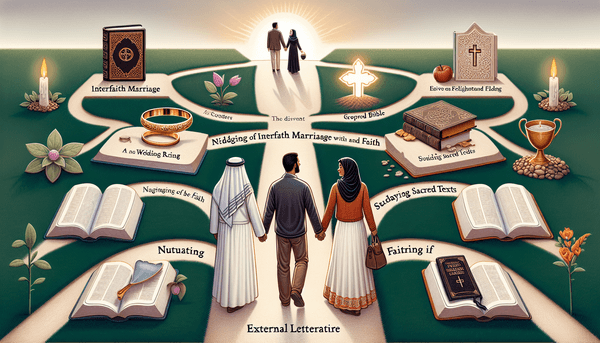Interfaith Marriage: Christian and Catholic Unions
In the eyes of faith, love is the universal language that transcends denominational boundaries. When a Christian and a Catholic decide to unite in marriage, they embark on a journey that can be both enriching and challenging. The Bible does not explicitly forbid such unions; rather, it emphasizes the importance of love and mutual respect within any marriage. In the words of the Apostle Paul, 'Wives, submit to your husbands as to the Lord... Husbands, love your wives, just as Christ loved the church and gave himself up for her' (Ephesians 5:22, 25). This mutual submission and love are the bedrock upon which any Christian marriage, interfaith or otherwise, should be built. Couples can thrive by respecting each other’s beliefs, engaging in open dialogue about their faith, and finding common ground in the shared values of Christianity, as seen in Romans 14:1-4, which calls us to accept one another without quarreling over disputable matters.
Staying Anchored in Faith and the Word
To stay firmly rooted in one's faith, it is essential to immerse oneself in the teachings of the Bible and engage with a community of believers. The Apostle Paul encourages believers to 'Let the word of Christ dwell in you richly as you teach and admonish one another with all wisdom' (Colossians 3:16). This emphasizes the importance of not only personal Bible study but also the value of sharing insights and learning from one another. Prayer is another cornerstone of a steadfast faith, providing a direct line to God's guidance and comfort. The Psalmist affirms this, declaring, 'Your word is a lamp for my feet, a light on my path' (Psalm 119:105), illuminating the importance of scripture in navigating the complexities of life and keeping our faith strong.
Exploring Literature Beyond the Bible
While the Bible remains the central text for Christians, exploring other literary works can also enrich one's spiritual journey. The Apostle Paul advises us to focus on whatever is true, noble, right, pure, lovely, and admirable (Philippians 4:8), a principle that can guide Christians in selecting complementary reading materials. However, it is important to approach external literature with discernment, ensuring that it aligns with Christian values and does not contradict biblical teachings. As we are reminded in 2 Timothy 3:16-17, 'All Scripture is God-breathed and is useful for teaching, rebuking, correcting and training in righteousness,' which serves as a benchmark for evaluating the spiritual value of any book or resource we choose to explore.






